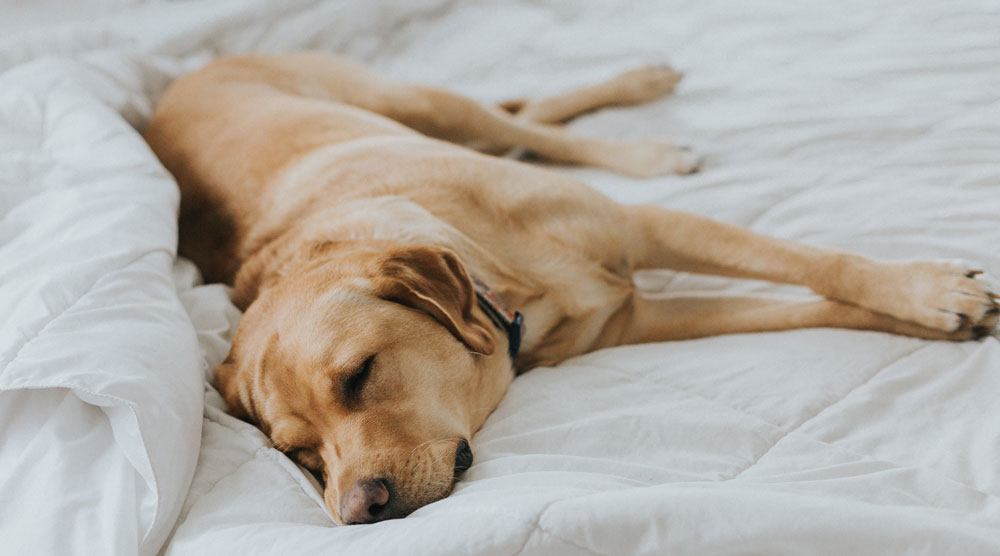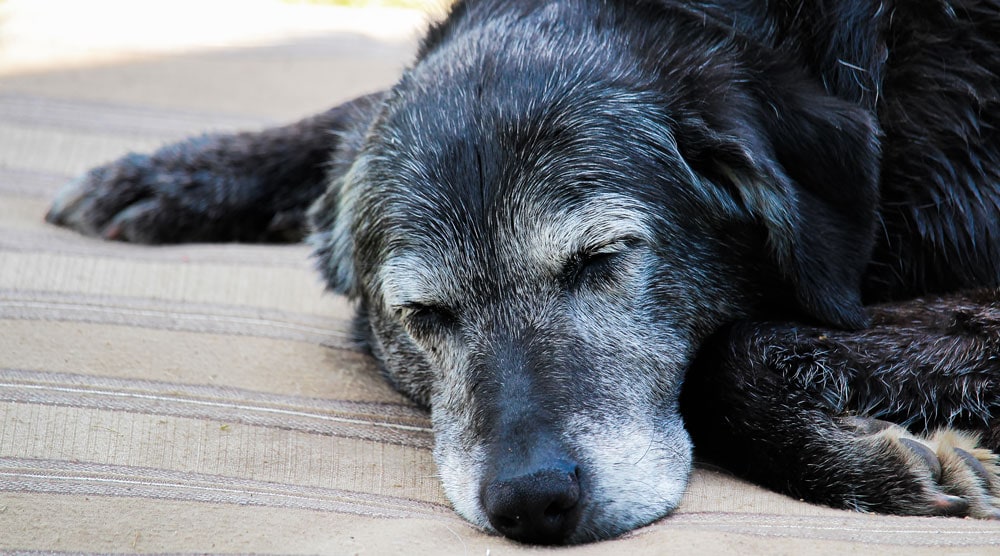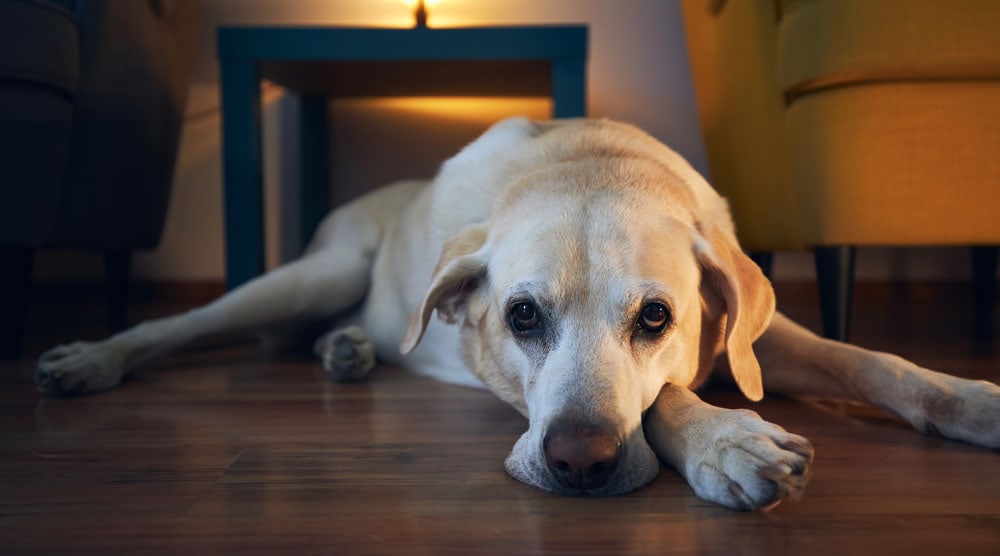It’s common to see a dog kick his back legs while sleeping. So let’s take a closer look at why this might happen – and whether it’s something to worry about.

The Quick Answer…
- Dogs often kick their back legs while sleeping due to dreaming during the REM stage of sleep.
- Puppies and older dogs may kick more. This is because their “pons”, a region of the brain responsible for turning off larger muscles, isn’t fully developed or weakens with age.
- Usually harmless, kicking can sometimes indicate medical issues like muscle spasms, seizures, or pain.
- It’s not recommended to wake a dog during kicking, as it may startle them and potentially cause a defensive bite.
- Contact a vet if you’re concerned or notice other symptoms, such as urinating, stressed movement, or interrupted sleep.
Contents
Just like humans, dogs dream when sleeping. These dreams can sometimes cause them to move in their sleep.
However, dreams aren’t the only reason for this behaviour, as kicking can also be a sign of a medical problem. Let’s take a closer look at why dogs kick during sleep and when you should be concerned.
Why Do Dogs Kick Their Back Legs While Sleeping?
The most common reason a dog kicks their back legs while sleeping is that they’re dreaming.
During the REM stage of sleep, larger muscles in the body are turned off by a part of the brain called the pons. However, the pons isn’t always entirely effective, which is what allows a small amount of twitching and kicking. You may also notice your dog’s breathing rate increases during an exciting dream.
For the most part, you don’t need to worry about a dog twitching or kicking during dreams. Unless it’s interrupting your dog’s sleep, it’s harmless and something most of our canine friends experience.
What Do Dogs Dream About?
Studies have found that dogs have complex dreams, but there’s no way to know for sure what they dream about.
One theory is that dogs dream about exciting or memorable experiences during the day, such as chasing cats or birds. This seems likely, especially as dreams often cause rapid movement and apparent excitement.
Dogs have a more limited imagination than humans, so we can probably assume they don’t dream intricate made-up scenarios. Creatures and situations they’ve never experienced likely don’t appear in their dreams.
That doesn’t mean they don’t have nightmares, though. Just like humans, dogs go through frightening experiences that may make a reappearance in dreams.
Why Do Some Dogs Twitch More Than Others?
The pons isn’t fully developed in puppies and may weaken with age in older dogs. Consequently, young and old dogs are often more prone to kicking.
Should I Wake My Dog Up if He’s Kicking During a Dream?
It’s tempting to wake up your dog when he’s kicking – especially if you think he’s having a nightmare. However, this is nearly always a bad idea.
Even the friendliest dog could bite when startled out of a dream. This is even more likely with intense or scary dreams.
Are There Other Potential Causes of Kicking or Twitching While Asleep?

Although most dogs twitch in their sleep due to dreams, there are medical issues that could potentially cause kicking. Here are a few examples, but contact a vet if you’re worried about your pet’s health.
Muscle Spasms
Muscle spasms can cause twitching or kicking. Spasms can also happen anytime, including when the dog is sleeping.
Some hints that your dog is spasming rather than dreaming include:
- The kicking or twitching starts or continues while awake
- It’s always the same part of the body
- They limp while awake
A spasm is often a symptom of another issue, ranging from allergies to physical injury. Therefore, it’s essential to contact a vet for an accurate diagnosis.
Seizures
Seizures are another reason your dog might kick or twitch. These can be very serious, so it’s important to contact a vet for urgent medical care.
A seizure often looks very different to a dream. Generalised seizures are most common in dogs, which affect the whole body. However, dogs can also suffer from focal seizures, which affect a single limb (or sometimes one side of the dog’s body).
Some signs of a seizure when sleeping include:
- The dog may jerk or suffer from muscle twitching
- The dog may drool or pant
- The dog may foam at the mouth
- The dog may defecate or urinate
- The dog seems dazed or confused after waking up (or even seem temporarily blind)
Pain and Stiffness
Pain and stiffness could make it difficult for your dog to get comfortable. This may force them to move around more in an attempt to get to sleep.
If the movement seems constant and restless, or is interrupting their sleep, then pain may be the reason.

When Should You Contact a Vet?
You should contact a vet if you have any doubts about why your dog is kicking his legs in his sleep. This is especially important if there are other symptoms.
Some kicking and twitching during sleep is natural for dogs, but something else may be going on if:
- They urinate
- They seem stressed after waking up
- Their sleep is being actively interrupted
- The movement seems stressed and violent
If you see these things, you should call your vet. Taking a video when this is happening can also be helpful to show your vet, since it’s unlikely your dog will recreate the same thing in their office.
Why Does My Dog Kick His Back Leg While Awake?
There are a few reasons your dog may kick their back leg while awake and most of them are nothing to worry about. However, just like when your dog is sleeping, you should watch for any signs that something more serious might be happening.
A common reason for kicking back legs is the scratch reflex. Dogs naturally twitch when something touches certain areas of the body to protect against unwanted insects and parasites.
Muscle spasms and seizures can also happen while awake — in fact, they most commonly do — so keeping an eye out for the above signs is also key to making sure any kicking and twitching is harmless.
Frequently Asked Questions
How Much Sleep Do Dogs Need?
Dogs have similar sleep cycles to humans, but they typically sleep for longer. Healthy adult dogs need between 8-13.5 hours a day, whereas younger puppies and seniors may need more.
If your dog is sleeping for a lot longer than this, then it’s wise to keep an eye on them and talk to a vet. This is especially true if their need for more sleep came on suddenly.
Can A Dog’s Legs Fall Asleep?
Yes! Just like humans, a dog’s leg can fall asleep if they sleep with pressure on certain nerves. Read our guide to “Can A Dog’s Legs Fall Asleep?” for more information.
Summary
Kicking during sleep is usually a sign that your dog is dreaming. However, monitoring your pet is essential, as kicking can sometimes be a sign of muscle spasms, pain, or even seizures.
Want to know more about your dog’s sleep habits? Check out our articles on the reasons why your dog might wake up in the middle of the night and why dogs sleep with their tongues out.We’ve also written a guide to why dogs wag their tails when asleep.




